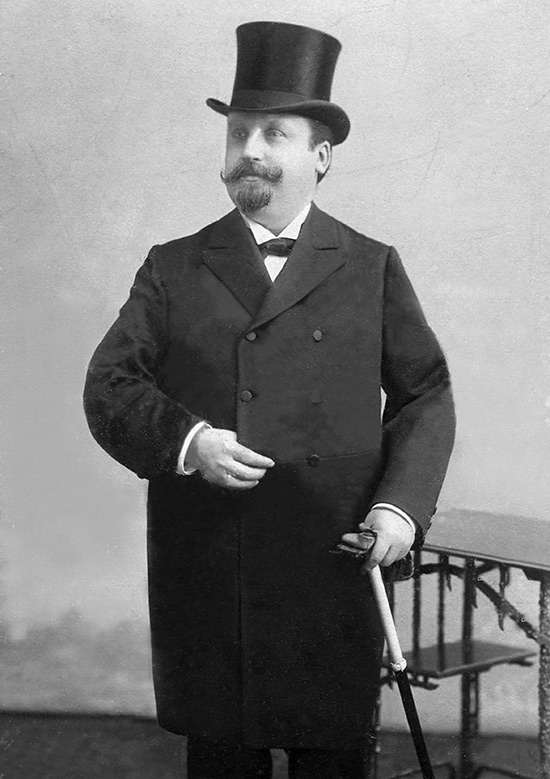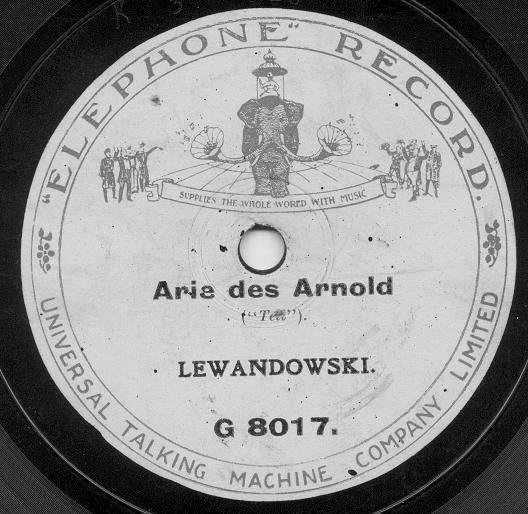Selmar Cerini's real name was Salomo Steifmann. From a strictly orthodox Jewish family, he ran away from home at 11 years old and sang
in various
synagogue choirs. It was his dream to sing professionally, but so as to win his fiancée's wealthy parents to accept him, he
started to
work in one of their businesses. But in the 1882 pogrom that swept through the Polish provinces of the Russian Empire, his in-laws lost
all their money, so he lost his job, and became a cantor at the synagogues in Zagórów and then in Łódź.
In 1887, he emigrated to Germany: to Breslau (today Polish Wrocław), where he attracted the attention of both the opera
director and
the chief cantor. They advised him to study voice, which he began in Berlin. As an illegal subject in Germany, he constantly had to
hide from the police so as not to be deported, but after a few months, he finally got a residence permit, and also found some wealthy
patrons.
He sang as a choir soloist in a Berlin synagogue, and made his operatic debut at the Victoria Theater, as the Muezzin in Charles Lecoq's
Ali Baba – a small but very important character who sings only one aria, which is the most prominent piece of the opera,
however... and sung behind the scene, which made it possible for Salomo Steifmann to go unrecognized as "Selmar Cerini". He was a big
success, and could soon sing a lot of operatic concerts in Berlin. On stage, he appeared for the first time in Halberstadt (as Manrico
and Alessandro Stradella), then in Stettin. Next, he got a five-year contract as an opera tenor in Leipzig, but left without having
ever sung there because antisemitism was so fierce in that city. Instead, he became first tenor in Breslau, and had
great success as Éléazar, Raoul, Arnold, Radamès, Manrico, Duca, Edgardo, Turiddu, Alessandro Stradella or Lyonel. As a
guest, he sang at the Berlin Kroll-Oper, in Magdeburg, Poznań/Posen, Görlitz, Ratibor, Kiel, Flensburg and a lot more
small places. Next, he was a member of the theater in Straßburg (today French Strasbourg), and a guest in Metz.
When the New Synagogue in Breslau sought to hire him as their new chief cantor in the mid-1890s, he accepted – and stayed there
until his 1923 death.
Cerini left more than 120 recordings of both cantorial music (in Hebrew and German) and opera and lied (in Polish and German), normally as Cerini,
which was of course already a pseudonym; however, not only on Lyrophon's elusive export label Elephone, but also on Lyrophon proper,
his Arnold aria was labeled as sung by "Lewandowski", which remains one of the many enigmas of the Lyrophon company. But it may be
worth mentioning that in his younger years, when he was a synagogue choir soloist in Berlin, he sang not least in the New Synagogue
choir directed by Louis Lewandowski, the famous composer of cantorial music.
Reference 1: A. Mirsky: Biografie Selmar Cerini (Steifmann), Oberkantor der Breslauer jüdischen Gemeinde, London 1900;
reference 2
Source for the picture and the Kozak recording as well as a lot of further information on Cerini (and recordings!): a website dedicated to him and run by his family.

